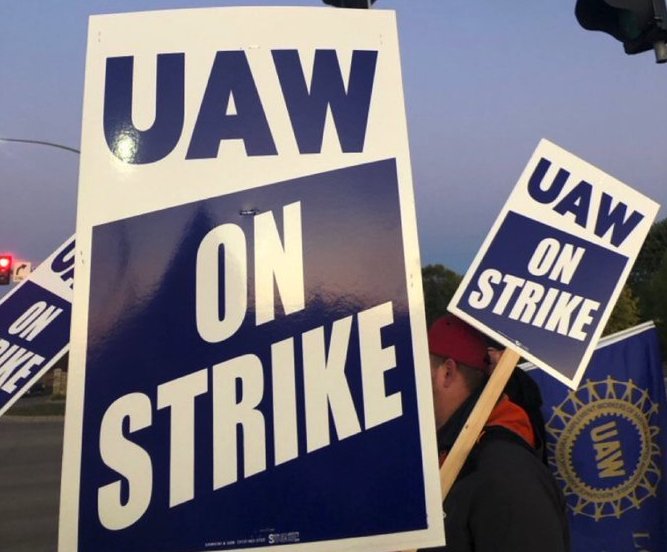About 10,000 United Auto Workers members employed by John Deere remain on strike after rejecting the second tentative agreement negotiated this fall. Pickets will continue around the clock at the equipment manufacturer’s facilities, including five plants in Iowa employing about 7,000 people.
Whereas around 90 percent of workers rejected Deere’s first proposal, the November 2 vote was much closer: about 55 percent against and 45 percent for accepting the deal. Turnout was high at roughly 90 percent of the unionized workforce.
The Des Moines Register’s Tyler Jett reported that 71 percent of UAW members in Waterloo (the company’s largest factory) opposed the agreement, and 64 percent voted no in Dubuque. UAW members in Ottumwa and Davenport voted for the proposal by wide margins, while workers in Ankeny split 51 percent yes and 49 percent no.
Jett summarized the key points of the tentative agreement:
- A 10 percent pay raise immediately (the previous offer called for 5 percent or 6 percent)
- An additional 5 percent raise in 2023 and another 5 percent raise in 2025 (Deere had offered 3 percent and 3 percent early last month)
- Quarterly cost-of-living increases, which were eliminated in Deere’s 2015 contract
- Bonuses for each worker on approval of the contract, and lump sum payments of 3 percent of a worker’s qualified earnings in 2022, 2024, and 2026
- Pension payments will increase, and future hires will continue to be part of the pension program
- Larger lump sum payments for the first five years of retirement, compared to the previous offer
According to Jett, “Overall, the UAW projects that members will see their hourly wages increase 30% from 2021 to 2027. Employees on the high end will make an extra $8.95 an hour by the end of the contract, while employees on the low end will make an extra $5.99 an hour.”
Several workers who opposed the deal told labor reporter Jonah Furman they thought the company’s second offer was good, but that they can do better if they hold the line. One who voted yes told Jett he “doubts the next gains will be significant enough to justify forgoing a paycheck while the strike stretches for weeks or months.”
The last John Deere strike, which began in 1986, lasted a little more than five months. The UAW is offering workers $275 a week in strike pay, which is far less than their normal wages.
UAW locals are accepting donations to support workers and their families. Items needed include non-perishable foods, take-out food containers, toiletries, clothing, and propane tanks to help keep the picketers warm.
Top image cropped from a photo Ross Grooters posted on Twitter, showing a UAW picket on November 2.

